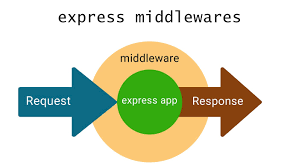What is Middleware in Node.js?
In the context of Node.js, particularly within frameworks like Express.js, middleware functions act as the intermediary between incoming requests and the final response. They are functions that have access to the request object (req), the response object (res), and the next middleware function in the application’s request-response cycle. Think of them as checkpoints or filters along the request pipeline. Each middleware function can perform various tasks before passing control to the next middleware or the final route handler.
Middleware is crucial for building modular, maintainable, and scalable Node.js applications. They allow you to separate concerns, handle common tasks efficiently, and improve code organization.
Key Functions of Middleware:
Middleware can handle a wide range of tasks, including:
- Request Logging: Record details about incoming requests for debugging and monitoring.
- Authentication and Authorization: Verify user identity and permissions before accessing specific resources.
- Body Parsing: Parse incoming request bodies (e.g., JSON, form data) into usable objects.
- Error Handling: Catch and handle errors gracefully, preventing application crashes.
- Rate Limiting: Restrict the number of requests from a specific IP address or user to prevent abuse.
- Static File Serving: Serve static assets like images, CSS, and JavaScript files.
How Middleware Works in Express.js:
Express.js, a popular Node.js framework, makes extensive use of middleware. Middleware functions are registered using the app.use() method. Here’s how it typically works:
- Request arrives: A client sends an HTTP request to your server.
- Middleware chain: Express.js executes the middleware functions sequentially. Each function has access to the
req,res, andnextobjects. - next() function: The
next()function is crucial. It passes control to the next middleware function in the chain. Ifnext()isn’t called, the request will halt at that particular middleware. - Route handler: Once all the applicable middleware has executed, the request reaches the route handler, which generates the response.
- Response sent: The server sends the HTTP response back to the client.
Example: Implementing Middleware in Express.js
Let’s illustrate with a simple Express.js example that demonstrates logging and a basic authentication check:
|
|
This example shows logger middleware logging every request and auth middleware checking for a specific authorization token. The /private route requires authentication.
Best Practices for Using Middleware:
- Keep middleware concise and focused: Each middleware function should have a single, well-defined responsibility.
- Order matters: The order in which you register middleware functions is crucial. They execute sequentially.
- Error handling: Use
try...catchblocks or dedicated error-handling middleware to handle potential exceptions. - Use built-in middleware: Leverage Express.js’s built-in middleware functions (like
express.json()for parsing JSON bodies) whenever possible.
By understanding and effectively utilizing middleware, you can create more organized, maintainable, and secure Node.js applications. Remember to carefully consider the order and functionality of your middleware to ensure your application behaves as intended.
